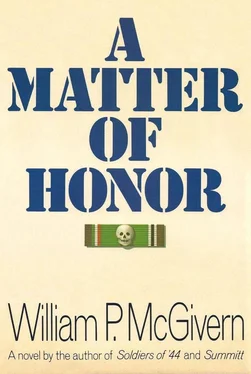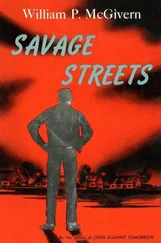He replaced the phone and turned to Caidin. “The hospital in Frankfurt’s been trying to reach us for an hour or more, but the line was tied up.”
“I was talking to Sergeant Gordon in Chicago, and then my paper.”
“A doctor just told me, a medical major, that the general died an hour ago. Scotty Weir didn’t make it after all, Miss Caidin. Can you believe that?” Grimes watched the young woman closely, studying her eyes, her mouth, as if to find an answer somewhere in her expression. She nodded helplessly.
“He was so alive to me,” she said. “I was just using his paper and pencils. There are some playbills in the desk drawer, a deck of cards...”
Grimes seemed not to hear. “It wasn’t the gunshot wounds at all, according to the major. That skulking bastard never killed him. It was an embolism, the doctor said, a blood clot that got loose and went for the heart,”
“It’s too much for me to take in,” Bonnie said. “I know I should weep, but it’s too soon, I feel I honor him by not crying.”
There was a flash of headlights across the windows, a crunch of gravel as a car pulled into the drive and Grimes went to the front door.
Duro Lasari came into the study, a rush of cold air around him, tired, his face troubled and dark. He put his arms around Bonnie and his lean, hard body felt hot, almost fevered through his clothes.
“I heard it on the car radio. I should have stayed with him, but goddamn it, he ordered me to leave him.”
“Please, Duro. You’re hurting my shoulders. I’m still bruised there.”
He slackened his grip and said, “ ‘It’s never as bad as it looks, soldier,’ those were the last words. But he’d called out to warn me, he took that shot for me. He just didn’t give a damn.”
“You’re wrong about that,” Grimes said. “Scotty Weir knew what he was doing. He always gave a damn.”
Lasari dropped his arms to his sides and began to pace the small study. “This is the last thing I expected. I had begun to understand him. I believed I would see him again.” He paused. “Maybe it was a decision he made out there at Schwartzwald. Maybe it was a moral one, but it was an action he’d conditioned himself to take.”
“We were friends for more than thirty years,” Grimes said. “I knew the man and respected him, but I’m just a snapass corporal. I don’t know if he’s the last of his kind or the start of a new breed.”
He looked around the study, the walls of books, the empty trophy cabinets, the folders of maps and papers stacked on shelves. “It shouldn’t end like this,” he said. “It has to mean more than that. We should talk about him, remember him. Someone should put it all on paper.”
“I’ve been thinking of little else for days,” Bonnie said.
Grimes walked to the foot locker with the flag folded on top, touching it reverently, “There’s more than a man’s life in that trunk, there’s history here, his speeches, his medals, his decorations. They should be sorted out, looked at, treated with respect. I’m too hurt by all this, it’s like a terminal wound to me. I wouldn’t know where to start.”
“Maybe I would,” Duro Lasari said, and took a packet from his pocket and placed it on the desk, folding back the leaves of tissue paper.
Bonnie Caidin bent close, then touched the object with the tip of her finger. “That’s a Medal of Honor, isn’t it? I never saw one before.”
Lasari put his hand on her shoulder lightly, but he seemed to be addressing someone beyond the shadows of the room. “You’re right, Bonnie, a Medal of Honor. The Army gave that to General Weir years ago, when he was just a kid, a private. The reason you never saw one before, well, there are just too damned few medals around these days. That’s the way I see it.”
John Grimes nodded and Bonnie Caidin said softly, “You’re right, Duro. And that’s the way I see it... far too few.”












